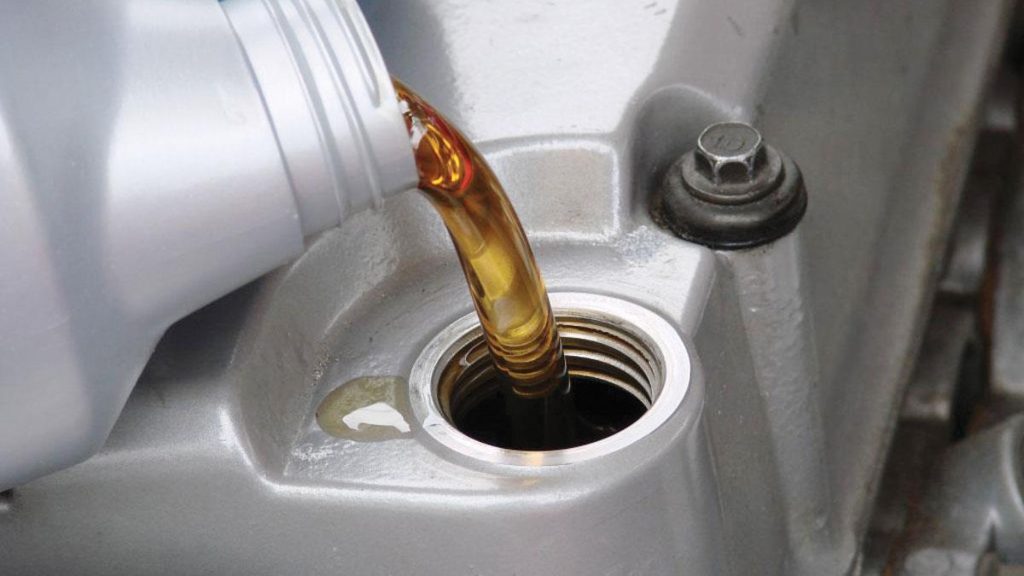Resources

The Common Problem: Engine Oil Consumption
What Really Causes This Problem?
There are only two ways your engine will consume oil, one is by burning it, and the other is by leaking it. If the engine is burning oil, this can indicate a few different problems in the engine. First is that oil is getting past the piston rings and entering the combustion chamber. Oil could be running down the valve guides or leaking past the shaft turbocharger if the vehicle is equipped with one.
And if you’re having to add additional oil, it means you’ve got an oil leak somewhere. Either of these last two would indicate that there’s a leaky seal problem in the engine.
One way to determine if the valve guide seals are the problem is to start the engine after it sits overnight and observe the tail pipe emissions. If you see a burst of blueish smoke when the engine first starts but then clears up in a short time, this is an indicator that oil is getting passed the valve seals. When an engine is shut off and left for a period of time, the oil runs down the valve guides and accumulates on the top side of the valves. When you first start the engine in the morning, the oil that has accumulated on the valves will burn off, causing temporary bluish tailpipe emissions.
To determine if the piston rings are the problem, it would be important to know if the engine has ever been overheated. If an engine overheats, the piston rings can lose their tension from the excess heat. The piston rings are supposed to fit tight against the cylinder walls, to establish good “ring seal”, if you’ve ever heard that term used. If the engine overheats, it may start to consume oil because the rings lose their tension and can no longer prevent oil from getting passed into the combustion chamber. A good indicator of this is a black carbon buildup on the spark plugs and continuous blue smoke being emitted from the exhaust pipe. This is unlike the valve seal problem where blue smoke would be seen from the exhaust for a short period of time when first starting the engine in the morning. The smoke doesn’t go away after a short period of time. If piston rings are the problem this will require major engine repairs to replace the rings.
If your engine is equipped with a turbo charger and you think the oil consumption might be due to a problem there, you should check the air discharge pipe for oil residue. When the shaft in the Turbo Charger wears and begins to wobble, the seals will not be able to contain the oil in the turbo charger. Turbo chargers do not have bearings because they spin at a high rate of speed when in use. The center shaft in the turbo charger floats on a continuous film of oil being pumped to it under pressure. Normally the oil returns back into the crankcase. If the oil leaks past the shaft seals, it will go directly into the intake Manifold and into the combustion chambers. You would see a lot of continuous blue smoke as it is burned.
Keep in mind that, when it comes to Turbo chargers, if there’s any sign of malfunction or damage, then they need to be repaired immediately. If they come apart (and many turbo chargers operate at 100,000 rpms), the metal pieces can be ingested into the engine. If this happens, an expensive major engine failure is in your vehicle’s future.
An oil leak is a serious problem because it can potentially contribute to a loss of lubrication for the engine. This is as serious a problem as you can get, since it means potential catastrophic engine damage.
How likely this is to happen depends on how serious the oil leak is. At best, a gradual loss of oil volume over time means less oil available for lubrication and dissipation of heat for the engine, which means the existing oil has to work harder and is more likely to form harmful engine oil sludge.
Sometimes you know the car is consuming more oil than it normally does in your experience. It may even be leaking oil. But it’s hard to go from that to a successful fix if you don’t know where the oil leak is located.
Oil leaks can be located by placing a clean piece of cardboard on the ground under the engine. This will give you a rough idea where on the engine you need to look to find the leak. If there is an excess amount of oil found on the engine, an engine cleaner can be used to remove the oil which will help in locating the leak.
The general rule is to always repair the highest oil leak first because you may have multiple leaks. Oil running down from the top of an engine can mask a leak from a lower component.
Re-tightening oil pans, valve covers, intake manifolds or other items that have gasket seals usually does not stop oil leaks. Many times oil leaks are caused by over tightening engine components with gaskets. Over tightening can split a gasket or cause them to slide out of position. Leaking gaskets in most cases will need to be replaced.
Finally, there are products you can find at your local auto parts store that are advertised as “stop-leak” fixes for oil leaks. These engine oil stop leak additives usually do not work.
The answer to this question is yes on computer controlled fuel systems which is the majority of vehicles on the road today. The main mission of the computer in our automobiles is to deliver a 14.7 air fuel ratio which is what the catalytic converter needs to function properly.
The computer uses an oxygen sensor in the exhaust system to manage this air fuel ratio. High readings from this sensor indicate a rich fuel condition and a low reading indicate a lean condition. The computers mission is to keep it in the middle which is not rich or lean and produces a 14.7 air fuel ratio.
An oxygen sensor needs to see a differential in oxygen between the exhaust gases and outside air in order to produce voltage signals the computer reads as rich or lean. The outside air sample enters the sensor between the wire leads on the back of it. Performance and fuel mileage can be greatly affected if anything interferes with this outside air sample.
Oil leaking from the rear of the valve covers or intake manifold can produce smoke if it is dripping on the exhaust system. This can interfere with the oxygen sensor operation which will affect what the computer does with fuel ratios resulting in negative drivability issues. The computer term, garbage in, garbage out applies here.
Are All Oil Additives Bad For Your Engine?
The short answer is no. But certainly bad for your wallet if all of them end up doing absolutely nothing. Some have the effect of hardening valve oil seals resulting in cracks forming and leakage in combustion chamber ensuing.
In other cases some oil additives will clean out the internal dirt along with dirt plugging an oil sump leak resulting in leakage now ensuing. In some other cases oil additives based on ceramic or other particulate bases might have an increased chance of plugging your oil filter and interfering with oil flow.
End result is people saying that all oil additives are snake oil, don’t work, cause leakages, or engine problems. The list is endless.

Generally engine oil ( whether conventional, semi-synthetic, or full synthetic ) is a product of base oils ( Group I – V ) blended with additives ( magnesium, calcium, phosphorus, zinc, molybdenum, barium, boron, silicon, potassium, manganese, titanium, sodium, etc ) that fall within accepted concentration bands.
A brand X engine oil can contain all the additives in the required concentrations and thus provide the engine with sufficient cleaning capability, lubrication, protection etc for the engine to perform optimally. In the event a brand Y engine oil with possibly less than standard additive concentrations is used then addition of supplementary oil additives must be considered if the same optimal engine performance is desired.
Whether an additive is having an effect or not is easier to tell by paying attention to engine performance ( power and driveability ) and fuel consumption. Especially in areas where the possibility of low engine oil manufacture, blending, and supply presently exists.
Once there is a deviation from the minimum engine oil standard higher fuel consumption is the consequence. Interestingly we have seen several vehicles record better fuel consumption figures after applying X-tend oil conditioner. So X-Tend either works or all our respondents are involved in a conspiracy we are not aware of.
So are oil additives bad for your engine? Not really, no. People think that they need an oil additive to “improve the lubrication” for their oil. But they don’t really need that because today’s high-performing oils do that job plenty well. They don’t actually need much help there. We agree. But are such “ high performing oils ” being provided to us ?
What they can use is help with their other functions – keeping the engine surfaces clean and free from particulates, neutralizing acids, etc. There are some good oil additives out there that extend the oil’s ability to do those important jobs. Those do have real value.
Remember, though, that if you use one of these oil additives, you shouldn’t interpret that as permission to deviate from the recommendations of your engine manufacturer for when you should change the oil. We always recommend that even if people use an oil additive like X-tra Lube, they should still do what their engine manufacturer recommends. So in one sense, an oil additive could be bad for your engine if you let it give you a false sense of security on changing your oil.
Are there any bad oil additives? Not in the sense that they’ll damage your engine (though we can’t speak for the entire additive universe, since oil additives aren’t regulated in the same sense that fuel additives are regulated).
So let’s get to the bottom line answer. The great majority of oil additives aren’t bad for your engine. But since they don’t really do a whole lot, and because you can’t really tell if they’re doing anything, they’re just bad for your wallet.
